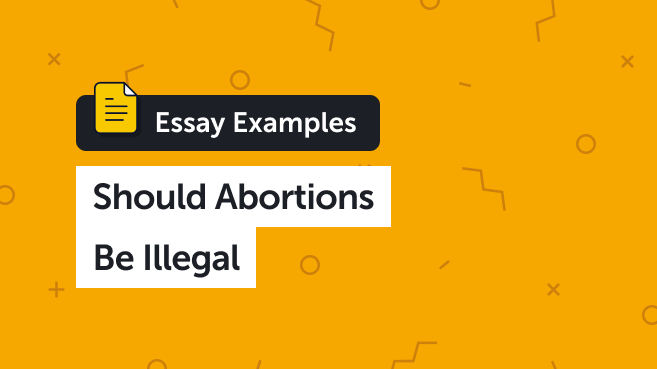Should Abortions Be Illegal?

Abortion has been a subject of discussion for a long time in the United States. People have made assertion about the issue. Thus, some of them advocate for its legality, while others condemn it on various grounds. Lack of a unanimous position from all the states of the country is the main reason for confusion among American citizens. Group identification and different biases may determine decision on the legality of abortion. However, abortion remains unacceptable and ought to be illegalized regardless of any opposition from pro-abortion groups.
I oppose the practice of abortion on three grounds. Firstly, life begins after fertilization and, therefore, procuring an abortion is equivalent to murder. This is the reason that made North Dakota in 2013 ban performing abortion after six weeks after the last menstruation (“Background of the Issue,” 2018). Secondly, the procuring of abortion causes unnecessary pain to the fetus after 20 weeks, which is the premise on which Nebraska’s Republicans abolished abortion (“Background of the Issue,” 2018). Lastly, the feeling of guilt that comes over a person long after contemplating on procuring an abortion or even after performing it is so dreadful that it can lead to destructive behaviors. However, the right company, such as being a member of the church, can make a positive impact on a person. For instance, McCorvey altered her position by becoming a member of pro-life even after the adoption of her child that she had opted to abort (“Background of the Issue,” 2018). Thus, it made a positive change in her since being a proponent of abortion, she began to strongly support pro-life claims that abortion is wrong.
Some of the reasons that were stated by the pro-abortion oppose my position. Firstly, it is argued that the life of an unborn can be terminated if the pregnancy was a result of rape or incest (“Background of the Issue,” 2018). This is because the pregnancy was not conceived in a mutual agreement, and hence when the child is born, she/he could be a reminder of the tormenting moment rather than a source of happiness.
Secondly, in Roe v. Wade lawsuit, the state of Texas outlawed abortion but had some reservations. It resolved that one can perform abortion regardless of the pain caused to the unborn for the greater good of saving the mother (“Background of the Issue,” 2018). Lastly, the pro-choice have been vocal in stating that the decision to perform abortion ought to be given to women since pregnancy is a part of their life, and hence only women have a right to decide what happens to their body.
In my evaluation against abortion, I encountered two biases. First, being impacted by the love to children made me perceive abortion as an act that is against my beliefs, and I would not like to live with the guilt of being a participant of abortion (Ehrlinger, Readinger, & Kim, 2015). The other bias is fatalism, which can be attributed to my religion inclination (Ehrlinger et al., 2015). Given that I am a member of the religion that strongly prohibits abortion, I felt this was the most critical aspect of identification that could justify my position. Hence, it is important to note that I based my stand on my beliefs and could not open my mind to any other line of thinking apart from what I have already experienced.
The effects of my group identification are that I have been restricted from being liberal in thinking, thus settling for what I perceive to be right. I have been compelled to take a stand on my beliefs, thinking that there is no other way of altering what has already been in existence (“Background of the Issue,” 2018). The anticipation of having a child of my own made me fear the outcome of abortion, which played a part in my stand. I strongly feel that a child is the source of happiness in every family and hence should be protected before and after birth.
My thinking has changed after playing the ‘Believing Game.’ I used to think that the other group may have valid some reasons for supporting abortion since the circumstances making a woman opt for aborting a child are not always the same. In spite of my beliefs in the value of life and its protection, I now feel that a woman has a choice of doing what is right to her in the situation in which she finds herself (“Background of the Issue,” 2018). This does not mean that abortion ought to be encouraged, but in critical times, the mother of a child should be allowed to do what she feels to be the right thing.
Conclusively, abortion is wrong and ought not to be legalized. It is evident that life begins after fertilization, and thus abortion will be equivalent to killing a human, which will leave the perpetrator with the guilt of murder. Some of the exceptions that can allow an abortion to be procured are when the pregnancy was a result of rape or incest since the mother may not feel comfortable to bring up children conceived in such way. The biases that affected my position include the impact bias, namely my love for children. The bias of fatalism made it easier for me to oppose abortion given that I belong to a religious group that prohibits it. My group identity hindered me from being liberal to abortion. As a result, even after playing the ‘Believing Game,’ my position remained the same.